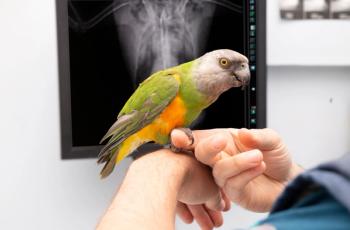
FBI sheds light on activist terrorism
Washington- In an age when activist often means more than mere protester, FBI experts warn veterinarians and those in the animal industry that extremists are elusive, dangerous and hard to predict.
Washington- In an age when activist often means more than mere protester, FBI experts warn veterinarians and those in the animal industry that extremists are elusive, dangerous and hard to predict.
Nearly seven months after vandals sabotaged and spray painted an empty Louisiana State University (LSU) veterinary research laboratory, New Orleans FBI agents request the public's help in solving the case. The Animal Liberation Front (ALF), an extremist animal rights group, claims responsibility, and the FBI offers a $20,000 reward leading to the arrest and conviction of those responsible.
Clues that ALF parties are involved might seem like a head start, but the organization's activists are hard to catch, says Phil Celestini, special agent in the FBI's Domestic Terrorism Operations Unit in Washington.
"These people are much smarter than average criminals on the street," he says. "They're elusive. You're not talking about a criminal organization in the classic sense. In terms of the level of property destruction and violence, it's escalating."
ALF claims responsibility for hundreds of violent incidents ranging from vandalism to arson and bombings. According to its Web site, supporters carried out at least 75 illegal actions in North America in 2003, and last fall, allegedly bombed two cosmetic product-testing companies in the San Francisco Bay area. ALF members always leave a hallmark, usually in the form of spray painted messages, Celestini says.
Trail of violence
"They want to propagate their ideology," he says. "They will come out and speak, but they won't talk about criminal activity. They're hard to catch because there's not membership, no rolls. You can be an ALF supporter one day and the next, decide you're not."
The group's mission: to "liberate" animals from "exploitive" environments using non-violent and violent means that usually cause financial loss through damage and destruction of property.
Colleges prone to attacks
That includes research, thus college medical and veterinary laboratories are especially prone to ALF attacks, says David Kinard, special projects coordinator with anti-terrorism training group Law Enforcement Academic Research Network, Inc.
In March, Kinard urged leaders to better prepare for activist terrorism during a presentation to industry insiders and American Veterinary Medical Association executives at the Animal Agriculture Alliance Stakeholders Summit in Arlington, Va.
"This means doing more than just putting up cameras, fences and hardware," he says. "It's about training people because this is a people problem. You're dealing with groups who have agendas. You've got to understand what they're thinking and how to respond."
The objective of effective counter terrorism is to neutralize a threat's capability to form, fund, equip and conduct operations within an area that needs protection.
Neutralizing the threat
"Understanding motives and methods of would-be attackers is part of the process," Kinard says.
Requiring background checks for employees is a good start, Celestini adds.
"These people frequently try to gain employment in the places they wish to target," he says. "Many of these people don't have criminal records, but it's safe to say if you have someone with a couple of graduate degrees and working on a Ph.D., they're grossly overqualified to clean cages in a laboratory and something's wrong."
Standard security will afford buildings and staff some measure of safety, but employment allows activists easy access, Celestini adds.
"It doesn't cost a lot of buy bolt cutters, dark clothing and a mask," he says. "With $100 worth of materials, you can do $1 million worth of damage."
Newsletter
From exam room tips to practice management insights, get trusted veterinary news delivered straight to your inbox—subscribe to dvm360.




